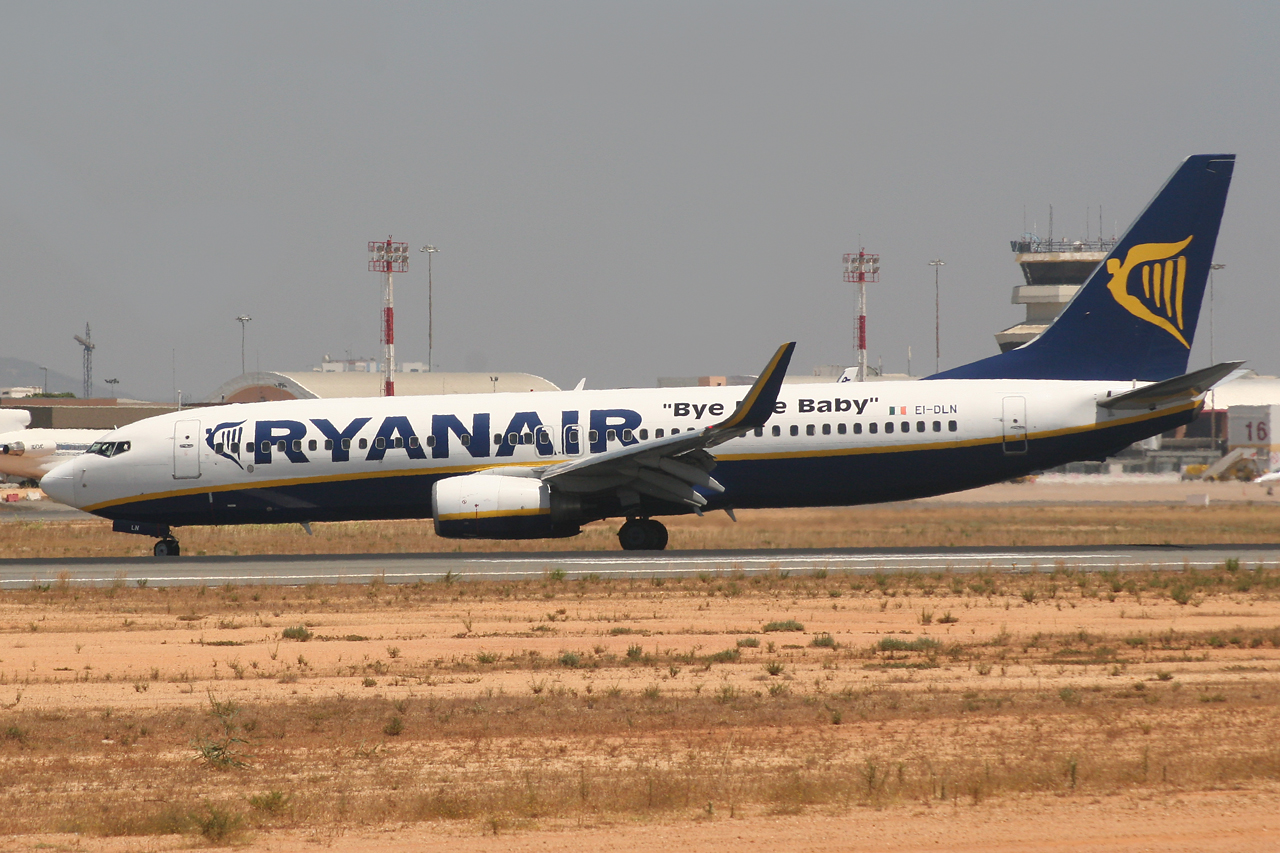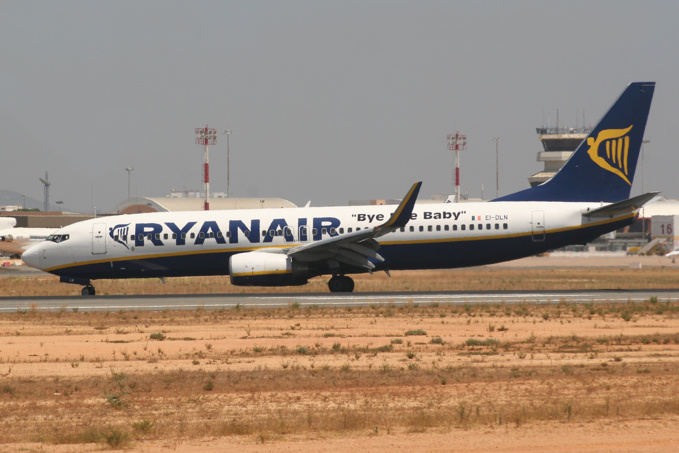However, what is happening in the German market is only part of the large-scale changes that the European air transport industry is going through. And judging by the latest events, this transformation is quite fast and not always painless. Three major airlines commenced bankruptcy proceedings from May to October: in May there was Italian Alitalia, in August - Air Berlin, and in October - British Monarch.
Some market leaders are not feeling good, too. First of all, there are the Irish low-cost Ryanair. Last year, it elbowed Lufthansa from the first place in the list of the largest airlines in Europe by the number of passengers carried over the year. However, in September, Ryanair found itself in a very embarrassing situation. Then, an acute shortage of pilots, which arose from errors in the planning of vacations of the flight crew, turned into a real blow to the company’s reputation.
The carrier had to cancel more than 2 thousand flights, and head of Ryanair Michael O'Leary made public apology to passengers and investors for the first time in the company’s history. At the same time, the carrier agreed to admit its mistake and offered passengers alternative flights and payment of compensation only after supervisory authorities intervened.
Meanwhile, now the pilots of Ryanair are openly expressing their discontent. They perceive this situation as a chance to bargain more favorable working conditions for themselves. If they succeed, the prices for the services of the Irish airline may grow, which would jeopardize the entire business model of the budget carrier.
Ryanair's internal problems also mean that this airline is about to leave the list of potential investors who could buy the assets of bankrupt market players. Just two days before the September collapse with the cancellation of flights, Michael O'Leary stated that the airline is going to acquire Alitalia’s European routes. Later, however, the Irish unexpectedly abandoned these plans.
The industry also expected that Ryanair would be interested in buying Air Berlin, although the company did not say so publicly. Yet, it turned out to be an ardent opponent of the Lufthansa deal to acquire the greater part of the troubled Berlin carrier. At a press conference in Berlin in late August, O'Leary called Air Berlin’s bankruptcy a "pre-prepared maneuver," which allegedly helped to literally present the airline to its main competitor, Lufthansa.
Ryanair’s head of is convinced that the procedure of bankruptcy of Air Berlin was staged for this purpose. According to him, the Irish carrier has already filed a complaint with the antimonopoly authority. In mid-October, O'Leary repeated that he would raise this issue with the EU antitrust authorities. According to his calculations, Lufthansa will control 95% of the passenger air transportation market in Germany after the transaction.
However, Lufthansa does not agree with this statement. The airline believes that the purchase of Air Berlin assets must be viewed from the point of view of the balance of forces not only in German, but also in the European market as a whole. According to company management, quoted by Reuters, Lufthansa’s share on routes to Germany and from Germany numbers 34%, while Air Berlin owned 14%. Since Lufthansa is acquiring only a part of his former rival, its share in the end will be below 48%. According to the company, this is equivalent to Ryanair’s share in Ireland.
Neither side wanted acquisition of Air Berlin to cause problems on the part of the cartel authorities. Thus, it was decided to invite at least one other potential buyer in the deal. Air Berlin is now in talks with British low-cost airlines EasyJet and German Condor to sell its remaining assets, Reuters reported on October 24, citing an unnamed source.
Initially, only Lufthansa and Easyjet had the exclusive right to negotiate purchase of Air Berlin shares. Last week, however, the Berlin carrier said that the exclusivity period for the British company had expired. EasyJet, which is trying to strengthen its position in the EU market in Brexit conditions, is interested in buying 25 Air Berlin aircraft.
These plans can be interrupted by a sudden bankruptcy of the British airline Monarch, one of the oldest and largest in the country. EasyJet can purchase the necessary personnel and aircraft from the carrier's bankruptcy estate at a much more favorable price. A few days after the termination of Monarch flights, it became known that EasyJet reduced the offer price for Air Berlin aircraft, which initially was about 50 million euros. This was reported by the German newspaper B.Z. with reference to sources close to Air Berlin.
Meanwhile, experts are warning of impending reduction of competition in the European market of passenger air travel. "We must prepare to the fact that there will be fewer competing companies in Europe in the medium term," expert in the field of air transportation Stephan Nagel said in an interview with ZDF. In his view, the alignment of forces in the European market will soon resemble the situation in the US, where the market is actually divided between five airlines.
source: dw.de
Some market leaders are not feeling good, too. First of all, there are the Irish low-cost Ryanair. Last year, it elbowed Lufthansa from the first place in the list of the largest airlines in Europe by the number of passengers carried over the year. However, in September, Ryanair found itself in a very embarrassing situation. Then, an acute shortage of pilots, which arose from errors in the planning of vacations of the flight crew, turned into a real blow to the company’s reputation.
The carrier had to cancel more than 2 thousand flights, and head of Ryanair Michael O'Leary made public apology to passengers and investors for the first time in the company’s history. At the same time, the carrier agreed to admit its mistake and offered passengers alternative flights and payment of compensation only after supervisory authorities intervened.
Meanwhile, now the pilots of Ryanair are openly expressing their discontent. They perceive this situation as a chance to bargain more favorable working conditions for themselves. If they succeed, the prices for the services of the Irish airline may grow, which would jeopardize the entire business model of the budget carrier.
Ryanair's internal problems also mean that this airline is about to leave the list of potential investors who could buy the assets of bankrupt market players. Just two days before the September collapse with the cancellation of flights, Michael O'Leary stated that the airline is going to acquire Alitalia’s European routes. Later, however, the Irish unexpectedly abandoned these plans.
The industry also expected that Ryanair would be interested in buying Air Berlin, although the company did not say so publicly. Yet, it turned out to be an ardent opponent of the Lufthansa deal to acquire the greater part of the troubled Berlin carrier. At a press conference in Berlin in late August, O'Leary called Air Berlin’s bankruptcy a "pre-prepared maneuver," which allegedly helped to literally present the airline to its main competitor, Lufthansa.
Ryanair’s head of is convinced that the procedure of bankruptcy of Air Berlin was staged for this purpose. According to him, the Irish carrier has already filed a complaint with the antimonopoly authority. In mid-October, O'Leary repeated that he would raise this issue with the EU antitrust authorities. According to his calculations, Lufthansa will control 95% of the passenger air transportation market in Germany after the transaction.
However, Lufthansa does not agree with this statement. The airline believes that the purchase of Air Berlin assets must be viewed from the point of view of the balance of forces not only in German, but also in the European market as a whole. According to company management, quoted by Reuters, Lufthansa’s share on routes to Germany and from Germany numbers 34%, while Air Berlin owned 14%. Since Lufthansa is acquiring only a part of his former rival, its share in the end will be below 48%. According to the company, this is equivalent to Ryanair’s share in Ireland.
Neither side wanted acquisition of Air Berlin to cause problems on the part of the cartel authorities. Thus, it was decided to invite at least one other potential buyer in the deal. Air Berlin is now in talks with British low-cost airlines EasyJet and German Condor to sell its remaining assets, Reuters reported on October 24, citing an unnamed source.
Initially, only Lufthansa and Easyjet had the exclusive right to negotiate purchase of Air Berlin shares. Last week, however, the Berlin carrier said that the exclusivity period for the British company had expired. EasyJet, which is trying to strengthen its position in the EU market in Brexit conditions, is interested in buying 25 Air Berlin aircraft.
These plans can be interrupted by a sudden bankruptcy of the British airline Monarch, one of the oldest and largest in the country. EasyJet can purchase the necessary personnel and aircraft from the carrier's bankruptcy estate at a much more favorable price. A few days after the termination of Monarch flights, it became known that EasyJet reduced the offer price for Air Berlin aircraft, which initially was about 50 million euros. This was reported by the German newspaper B.Z. with reference to sources close to Air Berlin.
Meanwhile, experts are warning of impending reduction of competition in the European market of passenger air travel. "We must prepare to the fact that there will be fewer competing companies in Europe in the medium term," expert in the field of air transportation Stephan Nagel said in an interview with ZDF. In his view, the alignment of forces in the European market will soon resemble the situation in the US, where the market is actually divided between five airlines.
source: dw.de



















